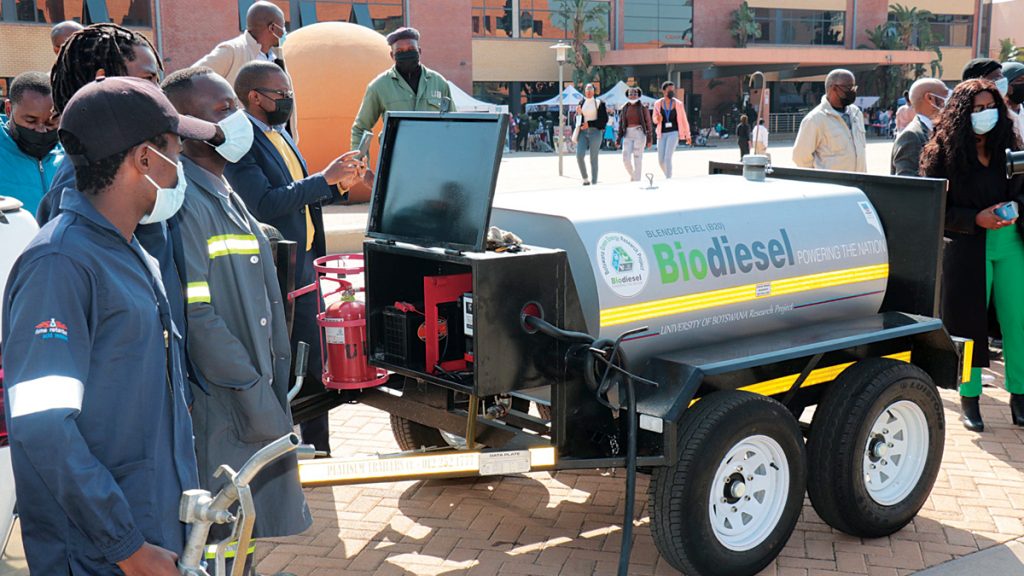KABO RAMASIA
editors@thepatriot.co.bw
Botswana’s quest for biofuel production by leveraging on animal fats and plant material to deliver the B20 biodiesel is on course to fruition, The Patriot on Sunday has learnt.
Giving welcome remarks at the official launch of the blended fuel(B20)/biodiesel production project on Thursday, the Vice Chancellor of the University of Botswana, Professor David Norris said the project which is fully funded by government of Botswana saw a collaboration of three research-oriented organisations being UB, Department of Agricultural Research, and the Department of Energy in the Ministry of Mineral Resources and Energy.
“This signals a significant step in the university’s mission of producing high-quality research for global impact,” said Professor Norris.
According to Prof Norris, UB plans to commercialise the production of biodiesel, with the research team currently focusing on biodiesel assessment targeting mass production for the market. The UB VC asserted that, the research team has delivered on the outputs as agreed with the main sponsor of the project, the government of Botswana. To demonstrate such capacity, he said the Faculty of Engineering Technology (FET) has a biodiesel testing lab which will soon be fully equipped for mass production. “We want to push research and impact society, not only in Botswana but throughout the world,” noted Prof Norris.
Emphasising UB’s intentions to fully transition into a fully-fledged research centre, Prof Norris said such a collaboration on research for development is one of the many engagements to come as the university celebrates its 40 years of existence. UB is committed to work with other stakeholders in the development of biodiesel industry in Botswana, he said.
Speaking to the institutional agreement between the three collaborating entities, the Deputy Director, Department of Energy, Thuso Matshameko, explained that the Memorandum of Understanding (MOU) was signed to align with government mandate of tapping into biofuel as an alternative energy source. “You cannot attain a knowledge-based economy without research. We want to see research being commercialised,” said Matshameko, advising Batswana to venture into new business opportunities presented by research for production.
For his part, Professor Clever Ketlogetswe, Principal Investigator(biodiesel) said the pilot project has satisfied all technical aspects of biodiesel testing. However, he decried challenges faced by the biodiesel industry in Botswana. According to Professor Ketlogetswe, the biggest challenge when doing research on the development of biodiesel in Botswana has been the fear of the unknown where members of the public believe that biodiesel cannot work better than petroleum products.
Prof Ketlogetswe implored all energy sector stakeholders to remove such unfounded fear from the public for the nation to unlock opportunities in the development of biodiesel. Biodiesel is biodegradable in its pure form and therefore causes less harm to the environment as opposed to petroleum diesel, he explained. Advantages of using biodiesel are that it is of a lower concentration and improves fuel lubricity. Above this, it leads to smooth running of the engine and higher engine performance and fuel saving, he said.
Moreover, Prof Ketlogetswe argued that biodiesel is more compatible with emission systems in modern vehicles. He noted that, since it is produced to international standards, thus far, UB and Jwaneng mine have dealt with the fear by having some of its selected fleet fuelled by the B20 biodiesel.
Commercialisation
Following the success of the pilot project and positive feedback from Jwaneng mine, Prof Ketlogetswe said going forward, UB together with its partners will scale up production to supply the whole country with biofuel.
According to Ketlogetswe, the project started small, moved to pilot stage, and now headed toward the development of biodiesel in Botswana. “Very soon, all UB vehicles will be running on blended fuel,”he said, bragging that as a research institution, UB will soon lead the nation on the commercial production and use of biofuel.
Sharing experiences of using the fuel, Energy Engineer at Debswana Diamond Company, Gaenamele Ganamotse, attested to the efficient operation of the mine’s machinery since adopting usage of biodiesel. He stated that for this research project, the mine selected a bus and graders and with time noticed reduction of smoke coming from exhaust, reduction of greenhouse gas emissions particularly carbon monoxide.
“To us this is another diamond. Jwaneng mine is waiting for biodiesel and this partnership is important to us as it is going to help the country,” he stated.
On behalf of Botswana Oil, New ventures Manager, Gamu Mpofu, equally supported usage of biofuel. He buttressed that it is indeed for the future. Supporting the initiative, he outlined that Botswana Oil has requested more companies to produce biodiesel. “We should commercialise this initiative,” he said. “ Botswana Oil should facilitate, meaningfully, this space working together with other stakeholders.”
